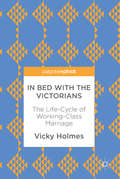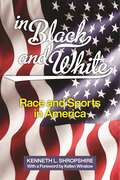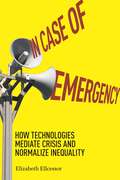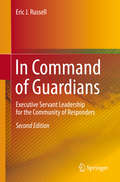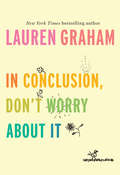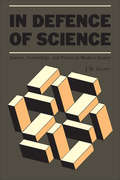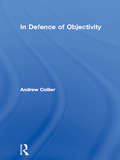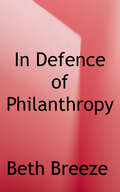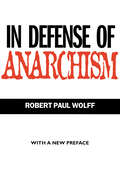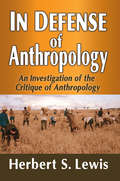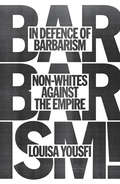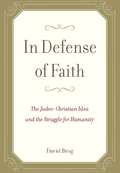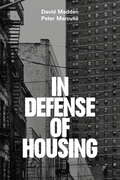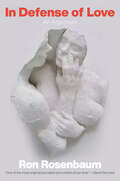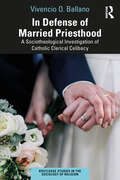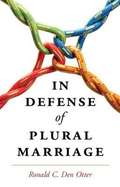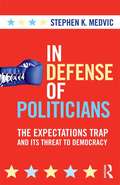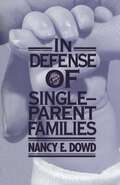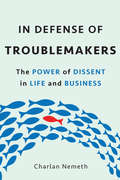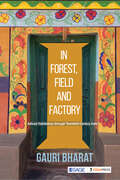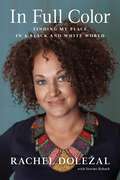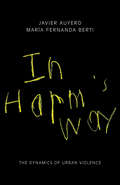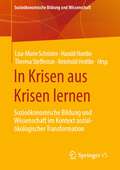- Table View
- List View
In Bed with the Victorians
by Vicky HolmesThis book examines the life-cycle of Victorian working-class marriage through a study of the hitherto hidden marital bed. Using coroners' inquests to gain intimate access to the working-class home and its inhabitants, this book explores their marital, quasi-marital, and post-marital beds to reveal the material, domestic, and emotional experience of working-class marriage during everyday life and at times of crisis. Drawing on the recent approach of utilising domestic objects to explore interpersonal relationships, the marital bed not only provides a rereading of the experiences of the working-class wife but also brings the much maligned or simply overlooked working-class husband into the picture. Moreover, it also extends our understanding of the various marriage-like arrangements existing throughout this class. Moving through the marital life-cycle, this book provides a greater understanding of marriages from the outset, during childbirth, at times of strife and marital breakdown, and upon the death of a spouse.
In Black and White: Race and Sports in America
by Kenneth L ShropshireConfronts the pressing problems surrounding race and diversity in the front offices of the American sports industryFrom the years of the Negro Leagues in baseball up to today, when college basketball programs entice and then fail to educate young Black men, sports in America have long served as a barometer of the country’s racial climate. Just as Black employees are often barred from the upper echelons of corporate America, they are underrepresented in the front offices of the sports industry as well. In this compact volume, Kenneth L. Shropshire confronts prominent racial myths head-on, offering both a history of—and solutions for—the most pressing problems currently plaguing sports. Despite the fact that Black athletes represent a huge majority of the American sports industry, the majority of ownership stake in professional basketball, baseball, and football teams is still held by white owners. And yet, when confronted with programs intended to diversify their front offices, many teams resort to the familiar refrain of merit-based excuses: there simply aren't enough qualified Black candidates or they don't know how to network. These hollow excuses not only stigmatize and exclude Black employees, but directly contradict the important value Black candidates can bring to these roles. In the insular world of sports, where former players often move up to become coaches, managers, executives, and owners, Black candidates are eminently qualified. After decades of active involvement with their sport, they often bring to the table experiences more relevant to the Black players on their teams. As a central aspect of American life, the sports industry has a responsibility to be a leader in the fight for racial equality—a responsibility that has not yet been met.In Black and White takes the industry to task, revealing claims of colorblindness and reverse racism as self-serving deflection and scrutinizing professional and collegiate sports, sports agents, and owners alike. No mere critique, however, the volume looks optimistically forward, outlining strategies that will drive the sports industry toward greater racial equality, and help it lead the way for racial justice efforts throughout America.
In Case of Emergency: How Technologies Mediate Crisis and Normalize Inequality
by Elizabeth EllcessorA much-needed look at the growth of emergency media and its impact on our livesIn an emergency, we often look to media: to contact authorities, to get help, to monitor evolving situations, or to reach out to our loved ones. Sometimes we aren’t even aware of an emergency until we are notified by one of the countless alerts, alarms, notifications, sirens, text messages, or phone calls that permeate everyday life. Yet most people have only a partial understanding of how such systems make sense of and act upon an “emergency.” In Case of Emergency argues that emergency media are profoundly cultural artifacts that shape the very definition of “emergency” as an opposite of “normal.” Looking broadly across a range of contemporary emergency-related devices, practices, and services, Elizabeth Ellcessor illuminates the cultural and political underpinnings and socially differential effects of emergency media. By interweaving in-depth interviews with emergency-operation and app-development experts, archival materials, and discursive and technological readings of hardware and infrastructures, Ellcessor demonstrates that emergency media are powerful components of American life that are rarely, if ever, neutral. The normalization of ideologies produced and reinforced by emergency media result in unequal access to emergency services and discriminatory assumptions about who or what is a threat and who deserves care and protection. As emergency media undergo massive growth and transformation in response to digitization and attendant entrepreneurial cultures, Ellcessor asks where access, equity, and accountability fit in all of this. The first book to develop a typology of emergency media, In Case of Emergency opens a much-needed conversation around the larger cultural meanings of “emergency,” and what an ethical and care-based approach to emergency could entail.
In Command of Guardians: Executive Servant Leadership For The Community Of Responders
by Eric J. RussellIn Command of Guardians: Executive Servant Leadership for the Community of Responders, Second Edition spotlights the philosophy of servant leadership and offers a pathway for strengthening first responder organizations. Responders work in high-risk, critical situations under the pressure of time and consequence. Being a responder means one must become an active player in the tragedies of others. Because these situations can change the responder over time, a special type of leader is needed to walk beside them while they navigate the realities of public safety and emergency service operations. This book illustrates how being a servant leader to these guardians allows the community of responders to strengthen their resiliency, foster individual growth, and perform at peak levels. “The book spans a wide breadth and depth, and is written in a way that engages the reader immediately. It is packed with sensitive and wise insights, as well as eminently practical advice for today’s emergency services leaders, as well as those of tomorrow.”- Emily Hough, Editor-In-Chief, Crisis Response Journal"Emotionally moving, research-based, and a compelling case for why any organization can benefit from a servant leadership organizational culture. Eric debunks the myth that servant leadership is "soft" and shows how the hard work of skilled servant-leaders is exactly what is needed in the alpha worlds of public safety and emergency services." - Duane Trammell, President, Trammell McGee-Cooper & Associates, Inc“Eric Russell is a pioneer in applying the principles of servant leadership to the communities of brave police, fire, and emergency services responders. This book is destined to be a classic reference work for the field.”-Don M. Frick, PhD, Authorized Robert Greenleaf biographer and co-author of Seven Pillars of Servant Leadership: The Wisdom of Leading by Serving.“In Command of Guardian speaks great leadership truths to first responder communities throughout the world. This is an important work for those in command of the men and woman who put their lives on the line to save others.” – Christophe Libeau, Lieutenant Colonel, Brigade de Sapeurs-Pompiers de Paris
In Conclusion, Don't Worry About It
by Lauren GrahamAdvice for graduates and reflections on staying true to yourself from the beloved Gilmore Girls actress and New York Times bestselling author of the memoir Talking as Fast as I Can and the novel Someday, Someday, Maybe. “If you’re kicking yourself for not having accomplished all you should have by now, don’t worry about it. Even without any ‘big’ accomplishments yet to your name, you are enough.” In this expansion of the 2017 commencement speech she gave at her hometown Langley High, Lauren Graham, the beloved star of Gilmore Girls and Parenthood, reflects on growing up, pursuing your dreams, and living in the here and now. “Whatever path you choose, whatever career you decide to go after, the important thing is that you keep finding joy in what you’re doing, especially when the joy isn’t finding you.” In her hilarious, relatable voice, Graham reminds us to be curious and compassionate, no matter where life takes us or what we’ve yet to achieve. Grounded and inspiring—and illustrated throughout with drawings by Graham herself—here is a comforting road map to a happy life. “I’ve had ups and downs. I’ve had successes and senior slumps. I’ve been the girl who has the lead, and the one who wished she had the bigger part. The truth? They don’t feel that different from each other.”
In Defence of Science: Science, Technology, and Politics in Modern Society
by Jack GroveScience holds a central role in the modern world, yet its complex interrelationships with nature, technology, and politics are often misunderstood or seen from a false perspective. In a series of essays that make extensive use of original work by sociologists, historians, and philosophers of science, J.W. Grove explores the roles and relationships of science in modern technological society. Modern Science can be viewed from four related perspectives. It is an expression of human curiosity – a passion to understand the natural world: what it is made of, how it is put together, and how it works. It is a body of practice – a set of ways of finding out that distinguish it from other realms of inquiry. It is a profession – a body of men and women owing allegiance to the pursuit of knowledge – and for those people, a career. And it is a prescriptive enterprise in that the increase of scientific understanding makes it possible to put nature to use in new kinds of technology. Each of these aspects of science is today the focus of critical scrutiny and, often, outright hostility. With many examples, Grove exposes the threats to science today: its identification with technology, its subordination to the state, the false claims made in its name, and the popular intellectual forces that seek to denigrate it as a source of human understanding and progress.
In Defence of Objectivity (Routledge Studies in Critical Realism)
by Andrew CollierFirst Published in 2004. Routledge is an imprint of Taylor & Francis, an informa company.
In Defence of Philanthropy
by Beth BreezeRunning down "do-gooders" has become a popular pastime in recent years. Journalists and academics alike have lampooned and criticized philanthropists and big donors for their charitable activities, which are often characterized as a means of self-aggrandisement or tax evasion. Yet, it is widely acknowledged that philanthropy - from the establishment of Carnegie libraries in the nineteenth century to the recent global health interventions of the Gates Foundation - has played a critical role in both developed and developing societies. <p><p>In an impassioned defence of the role of philanthropy in society, Beth Breeze tackles the main critiques levelled at philanthropy and questions the rationale for undermining and disparaging philanthropic acts. She contends that although it might be flawed, philanthropy is a sector that ought to be celebrated and championed so that an abundance of causes and interests can flourish.
In Defense of Anarchism
by Robert Paul WolffIn Defense of Anarchism is a 1970 book by the philosopher Robert Paul Wolff, in which the author defends individualist anarchism. He argues that individual autonomy and state authority are mutually exclusive and that, as individual autonomy is inalienable, the moral legitimacy of the state collapses.
In Defense of Anthropology: An Investigation of the Critique of Anthropology
by Herbert S. LewisThis book argues that the history and character of modern anthropology has been egregiously distorted to the detriment of this intellectual pursuit and academic discipline. The "critique of anthropology" is a product of the momentous and tormented events of the 1960s when students and some of their elders cried, "Trust no one over thirty!" The Marxist, postmodern, and postcolonial waves that followed took aim at anthropology and the result has been a serious loss of confidence; both the reputation and the practice of anthropology has suffered greatly. The time has come to move past this damaging discourse. Herbert S. Lewis chronicles these developments, and subjects the "critique" to a long overdue interrogation based on wide-ranging knowledge of the field and its history, as well as the application of common sense. The book questions discourses about anthropology and colonialism, anthropologists and history, the problem of "exoticizing'the Other,'" anthropologists and the Cold War, and more. Written by a master of the profession, In Defense of Anthropology will require consideration by all anthropologists, historians, sociologists of science, and cultural theorists.
In Defense of Barbarism: Non-Whites Against the Empire
by Louisa YousfiA provocative, beautiful and defiant essay highlighting the pitfalls of integration in France by a talented young writer with North African rootsIs social integration all it&’s cracked up to be? Not in the defiant view of first-time French author Louisa Yousfi, who herself has North African roots. Taking its inspiration from the leading Algerian writer Kateb Yacine(&‘I&’m better off not being too cultivated. I have to retain a certain barbarianism&’), this provocative essay explores ways of resisting the cultural and moral hegemony of the French "Empire."Citing a wide range of cultural references, from the characters of Chester Himes and Toni Morrison to the in-your-face rap lyrics of the &‘street prophets&’ Booba and PNL, she extolls the virtues of her inner barbarian and champions those brave souls who refuse to be &‘domesticated&’.Challenging the conventional wisdom that posits integration as an unalloyed good, she shows how assimilation can equate to the loss of traditions, religion, language, and culture. And, whether discussing 9/11, the Algerian colonial era, the media treatment of celebrities of Arab origin, or the second-class status of French citizens from an immigrant background, she holds an uncompromising mirror up to the West and its moral shortcomings, as if to say: a barbarian I may be, but who is the real monster?Yousfi, a young, charismatic and dynamic author who uses a refreshingly wide range of cultural reference points, including rap music, to construct her argument, opens up the path of a decolonial cultural politics and an aesthetics of resistance.
In Defense of Faith
by David BrogReligious faith is under assault. In books and movies and on television, militant secular critics attack religion with a renewed vigor. These "new atheists" repeat a two-part mantra: that religious faith is hopelessly irrational and that those possessed of such faith are responsible for the hatred and bloodshed that has plagued humanity. Abandon religion, they urge us, and the world will at last live in peace.In Defense of Faith examines this proposition in the context of Western civilization and the Judeo-Christian tradition and asserts that, far from encouraging hatred and violence, the Judeo-Christian tradition has easily been the most effective curb upon the dark defects of human nature and our best tool in the struggle for humanity.From the Christian activists who fought to stop the genocide of Indians in South America and their ethnic cleansing in North America, to the abolition of African slavery on both sides of the Atlantic, and on to modern human rights activists from Martin Luther King Jr. to the rock star Bono-In Defense of Faith rebuts the fashionable arguments against religion and presents the strong and lasting record of the Judeo-Christian idea. History has not been as kind to the atheist model: every time it is put to the test, we have reverted to the most base, violent instincts of our selfish genes.
In Defense of Housing: The Politics of Crisis
by David Madden Peter MarcuseIn every major city in the world there is a housing crisis. How did this happen and what can we do about it?Everyone needs and deserves housing. But today our homes are being transformed into commodities, making the inequalities of the city ever more acute. Profit has become more important than social need. The poor are forced to pay more for worse housing. Communities are faced with the violence of displacement and gentrification. And the benefits of decent housing are only available for those who can afford it.In Defense of Housing is the definitive statement on this crisis from leading urban planner Peter Marcuse and sociologist David Madden. They look at the causes and consequences of the housing problem and detail the need for progressive alternatives. The housing crisis cannot be solved by minor policy shifts, they argue. Rather, the housing crisis has deep political and economic roots—and therefore requires a radical response.
In Defense of Love: An Argument
by Ron RosenbaumFrom the acclaimed author of The Shakespeare Wars and Explaining Hitler comes a stirring manifesto on love in the modern age.Who wrote the book of love?In an impassioned polemic, Ron Rosenbaum—who has written books on the mysteries of Hitler&’s evil, the magic of Shakespeare&’s words, and the terrifying power of thermonuclear explosions—takes on perhaps his greatest challenge: the nature of love. Rosenbaum argues that what we know as love is imperiled now by the quantifiers, the digitizers, and their algorithms, who all seek to reduce love to electrical, chemical, and mathematical formulas.Rosenbaum brings excitement to his thinking as he interrogates the neuroscience of love, with its &“trait constellations,&” and the efforts of others to turn all human lovers into numerical configurations. He asks us why our culture has become so obsessed with codifying and quantifying love through algorithms. The very capacity that makes us human, Rosenbaum argues, is being taken over by numerical methods of explanation.In Defense of Love is more than an examination of the intersection of love with literature and science. It is a celebration of the persistence of a mysterious and uncanny phenomenon: the inexorable power of love.
In Defense of Married Priesthood: A Sociotheological Investigation of Catholic Clerical Celibacy (Routledge Studies in the Sociology of Religion)
by Vivencio O. BallanoThis book offers an analysis of the sociological, historical, and cultural factors that lie behind mandatory clerical celibacy in the Roman Catholic Church and examines the negative impact of celibacy on the Catholic priesthood in our contemporary age. Drawing on sociological theory and secondary qualitative data, together with Church documents, it contends that married priesthood has always existed in some form in the Catholic Church and that mandatory universal celibacy is the product of cultural and sociological contingencies, rather than sound doctrine. With attention to a range of problems associated with priestly celibacy, including sexual abuse, clerical shortages, loneliness, and spiritual sloth, In Defense of Married Priesthood argues that the Roman Catholic Church should permit marriage to the priesthood in order to respond to the challenges of our age. Presenting a sociologically informed alternative to the popular theological perspectives on clerical celibacy, this book defends the notion of the married priesthood as legitimate means of living the vocation of Catholic priesthood—one which is eminently fitting for the contemporary world. It will therefore appeal to scholars and students of religion, theology, and sociology.
In Defense of Plural Marriage
by Den Otter, Ronald C.With over half of Americans now in favor of marriage equality, it is clear that societal norms of marriage are being quickly redefined. The growing belief that the state may not discriminate against gays and lesbians calls into question whether the state may limit other types of marital unions, including plural marriage. While much has been written about same-sex marriage, as of yet there has been no book-length legal treatment of unions among three or more individuals. The first major study on plural marriage and the law, In Defense of Plural Marriage begins to fill this lacuna in the scholarly literature. Ronald C. Den Otter shows how the constitutional arguments that support the option of plural marriage are stronger than those against. Ultimately, he proposes a new semi-contractual marital model that would provide legal recognition for a wide range of intimate relationships.
In Defense of Plural Marriage
by Ronald C. Den OtterWith over half of Americans now in favor of marriage equality, it is clear that societal norms of marriage are being quickly redefined. The growing belief that the state may not discriminate against gays and lesbians calls into question whether the state may limit other types of marital unions, including plural marriage. While much has been written about same-sex marriage, as of yet there has been no book-length legal treatment of unions among three or more individuals. The first major study on plural marriage and the law, In Defense of Plural Marriage begins to fill this lacuna in the scholarly literature. Ronald C. Den Otter shows how the constitutional arguments that support the option of plural marriage are stronger than those against. Ultimately, he proposes a new semi-contractual marital model that would provide legal recognition for a wide range of intimate relationships.
In Defense of Politicians: The Expectations Trap and Its Threat to Democracy (Controversies in Electoral Democracy and Representation)
by Stephen K. MedvicPoliticians are reviled. From jokes on late-night TV talk shows to radio show rants and from public opinion polls to ubiquitous conventional wisdom--politicians are among the most despised professional class in modern society. Drawing on seminal work in political science, Stephen K. Medvic convincingly argues to the masses that this blanket condemnation of politicians is both unfair and unwarranted. While some individual politicians certainly deserve scorn for misjudgments, moral failings, or even criminal acts, the assumption that all of them should be cast in a similar light is unjustified. More importantly, that deeply cynical assumption is dangerous to the legitimacy of a democratic system of government. Politicians, as a class, deserve respect, not out of blind obedience to authority but because democratic deliberation requires it. Medvic explains how cognitive biases in the way people reason often lead us to draw unjustified conclusions of politicians in general based on the malfeasance of some. Scandals involving politicians are likely to be remembered and to serve as "evidence" of the belief that "they all do it. " Most politicians, in fact, care deeply about their cities, states, and nation. But they face a trap of unrealistic and contradictory expectations from the public about how politicians should behave. Medvic, in turn, demonstrates the necessity of ambition, the utility of politics for resolving conflicts peacefully, and the value of ideology in framing political choices. In the end, citizens must learn to tolerate the inherent messiness of politics as the only viable alternative to violent conflict. In the process, we must embrace our role in the political system as well.
In Defense of Single-Parent Families
by Nancy E DowdAn expert in family law and policy presents a thought-provoking examination of the stereotypes, realities, and possibilities of single-parent families. Single-parent families succeed. Within these families children thrive, develop, and grow, just as they do in a variety of family structures. Tragically, they must do so in the face of powerful legal and social stigma that works to undermine them. As Nancy E. Dowd argues here, this stigma is founded largely on myths which result in harshly punitive social policies. Dowd details the primary justifications for stigmatizing single-parent families, marshalling an impressive array of resources that portray a very different picture of them. She describes them in all their forms, with particular attention to the differential treatment given to never-married and divorced single parents, and to the impact of gender, race, and class. Illustrating the harmful impact of current laws concerning divorce, welfare, and employment, Dowd makes a powerful case for centering policy around the welfare and equality of all children.
In Defense of Troublemakers: The Power of Dissent in Life and Business
by Charlan NemethAn eminent psychologist explains why dissent should be cherished, not fearedWe've decided by consensus that consensus is good. In In Defense of Troublemakers, psychologist Charlan Nemeth argues that this principle is completely wrong: left unchallenged, the majority opinion is often biased, unoriginal, or false. It leads planes and markets to crash, causes juries to convict innocent people, and can quite literally make people think blue is green. In the name of comity, we embrace stupidity. We can make better decisions by embracing dissent. Dissent forces us to question the status quo, consider more information, and engage in creative decision-making.From Twelve Angry Men to Edward Snowden, lone objectors who make people question their assumptions bring groups far closer to truth--regardless of whether they are right or wrong. Essential reading for anyone who works in groups, In Defense of Troublemakers will radically change the way you think, listen, and make decisions.
In Forest, Field and Factory: Adivasi Habitations through Twentieth Century India
by Gauri BharatIn the early twentieth century, Adivasi villages typically comprised small wooden huts amid a thickly forested landscape. Today, Adivasi dwellings are larger, more permanent, built of mud and often covered with elaborate murals. Drawing out stories of everyday lives that have largely remained hidden from history, In Forest, Field and Factory: Adivasi Habitations through Twentieth Century India uncovers how and why Adivasi dwellings changed, and what it reveals about communities’ relationships with their environments. The book focuses on Santals, one of the largest Adivasi communities in eastern India, who are particularly renowned for precision and craftsmanship in domestic architecture and mural art. Why did Santal families shift from using wood to building with mud? How did different Santal villages develop distinctly different mural art traditions? In answering these questions, a new kind of historical narrative emerges—one that is not about buildings alone but also provides insights into Adivasi people’s lives and their engagements with social, environmental and historical environments via architecture. This book will be of equal interest to students and scholars of architecture, history, environment studies and anthropology.
In Full Color: Finding My Place in a Black and White World
by Rachel Dolezal Storms RebackA lot of people have made up their minds about Rachel Doležal. But none of them know her real story. In June 2015, the media "outed" Rachel Doležal as a white woman who had knowingly been "passing" as Black. When asked if she were African American during an interview about the hate crimes directed at her and her family, she hesitated before ending the interview and walking away. Some interpreted her reluctance to respond and hasty departure as dishonesty, while others assumed she lacked a reasonable explanation for the almost unprecedented way she identified herself. What determines your race? Is it your DNA? The community in which you were raised? The way others see you or the way you see yourself? With In Full Color, Rachel Doležal describes the path that led her from being a child of white evangelical parents to an NAACP chapter president and respected educator and activist who identifies as Black. Along the way, she recounts the deep emotional bond she formed with her four adopted Black siblings, the sense of belonging she felt while living in Black communities in Jackson, Mississippi, and Washington, DC, and the experiences that have shaped her along the way. Her story is nuanced and complex, and in the process of telling it, she forces us to consider race in an entirely new light—not as a biological imperative, but as a function of the experiences we have, the culture we embrace, and, ultimately, the identity we choose.
In Harm's Way
by Javier Auyero María Fernanda BertiArquitecto Tucci, a neighborhood in Buenos Aires, is a place where crushing poverty and violent crime are everyday realities. Homicides--often involving young people--continue to skyrocket, and in the emergency room there, victims of shootings or knifings are an all-too-common sight. In Harm's Way takes a harrowing look at daily life in Arquitecto Tucci, examining the sources, uses, and forms of interpersonal violence among the urban poor at the very margins of Argentine society.Drawing on more than two years of immersive fieldwork, sociologist Javier Auyero and María Berti, an elementary school teacher in the neighborhood, provide a powerful and disarmingly intimate account of what it is like to live under the constant threat of violence. They argue that being physically aggressive becomes a habitual way of acting in poor and marginalized communities, and that violence is routine and carries across various domains of public and private life. Auyero and Berti trace how different types of violence--be it criminal, drug related, sexual, or domestic--overlap, intersect, and blur together. They show how the state is complicit in the production of harm, and describe the routines and relationships that residents, particularly children, establish to cope with and respond to the constant risk that besieges them and their loved ones.Provocative, eye-opening, and extraordinarily moving, In Harm's Way is destined to become a classic work on violence at the urban margins.
In Krisen aus Krisen lernen: Sozioökonomische Bildung und Wissenschaft im Kontext sozial-ökologischer Transformation (Sozioökonomische Bildung und Wissenschaft)
by Reinhold Hedtke Lisa-Marie Schröder Harald Hantke Theresa SteffestunDas zu Beginn der Corona-Krise heraufbeschworene „neue Normal“ wird von Krisen geprägt sein. Schon früher traten miteinander verwobene Krisen wie die Finanz- und Wirtschaftskrise 2007 ff., die Staatsschulden- und Eurokrise 2010, Armutskrisen oder die Krisen der liberalen Demokratie, etwa durch den Rechtspopulismus, zutage. Die Pandemie ist allgegenwärtig, das Klima bildet den Inbegriff einer Dauerkrise, die weitere Krisen evozieren wird. Die Omnipräsenz von Krisen fordert die Gesellschaft heraus.Dieser Themenband widmet sich dem Umgang mit Krisen aus der Perspektive sozioökonomischer Bildung und Wissenschaft. Ausgehend von den Erfahrungen des Lehrens und Lernens in Krisen erörtern die Beiträge u. a. folgende Fragen: Welche Bildungsinhalte, -formen und -politiken helfen, um in Krisen aus Krisen zu lernen? Welche Wege zum Umgang mit dem Dauerkrisenzustand bietet die sozioökonomische Wissenschaft? Neben programmatischen, theoretischen und historischen Abhandlungen stellt der Band Lehr-Lernformate dar, die diese Herausforderung angenommen haben. Präsentiert werden fachdidaktische und fachwissenschaftliche Antworten auf multiple Krisen als Inspiration für Ansätze und Aktivitäten einer kritisch-transformativen sozioökonomischen Bildung und Wissenschaft.
